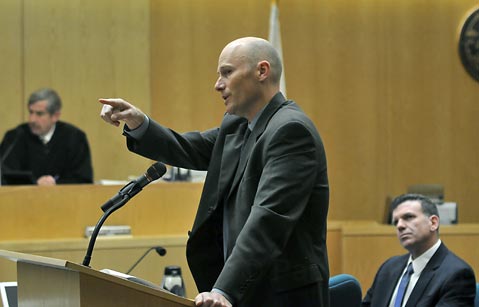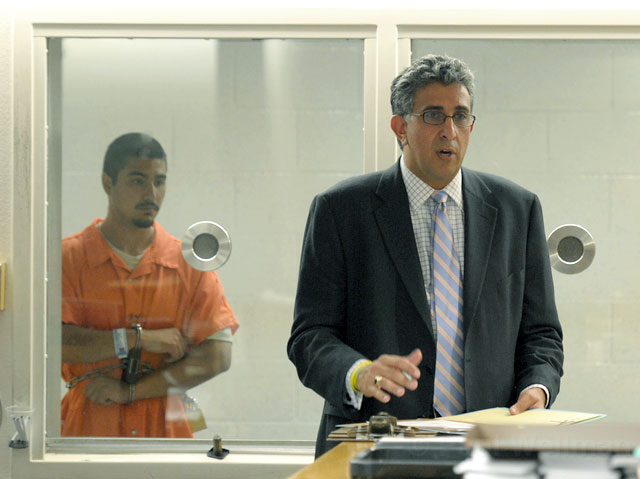Prosecutor Allowed to Stay on Vargas Murder Trial
Defense Alleged DA's Office and Attorney Acted Inappropriately
The murder trial of Benjamin Vargas, accused of killing a Santa Barbara man in Isla Vista last year, will move forward after a judge declined to recuse the District Attorney’s office — or its selected prosecutor — during pretrial motions on Monday.
In a separate action Monday afternoon, Judge George Eskin also said the murder charge against Vargas, 20, could move forward, despite arguments from his attorney that he acted in self-defense. Jury selection begins Tuesday afternoon.

Vargas’s attorney, Ron Bamieh, filed a motion to recuse prosecutor Hans Almgren, specifically, and the District Attorney’s office, generally, saying Almgren stepped over the line by seeking indictments against two women — Vargas’s sister and girlfriend — in connection to the case. Bamieh argued that the only reason Almgren did so was to keep the women from testifying in defense of Vargas at his trial out of fear of self-incrimination. “When the District Attorney’s Office decides the legal justice system is going to be used to hamper a defense for someone charged with murder … that’s a conflict,” Bamieh argued in front of the court.
The judge, however, said that regardless of whether they were presently facing criminal charges or not, the women would have to be careful about self-incrimination on the witness stand.
Almgren noted that, while he sought the indictment against the women just prior to the scheduled start of Vargas’s trial, the timing was curious only because that’s when he got information that led his office to conclude that a crime had been committed by Karen Medina and Maria Vargas. Medina was at the scene of the alleged murder, while Vargas drove her brother and Medina home from Isla Vista that night. But there was no clear indication the two had knowledge of what actually happened — aside from the fact a fight had taken place — as they were leaving the scene.

Bamieh brought the recusal motion after Eskin threw out the charges against Medina and Maria Vargas two weeks ago. In doing so, the judge said that “a properly informed grand jury would have declined to find probable cause to indict” Maria Vargas, and that the “cumulative effect of errors and omissions in the conduct of the grand jury proceedings … created substantial prejudice” to Medina’s right to due process. Despite that, the judge said Monday, there was no evidence of a conflict, and Vargas’s rights had not been jeopardized.
Also Monday, Bamieh tried to convince Eskin that Velasquez was the aggressor in the case and that Vargas acted in self-defense and, as a result, could not legally face a murder charge but, at most, could be convicted of manslaughter.
The defense is alleging that Velasquez — who threw the first punch — was the aggressor in the situation, while Almgren said that “the people are going to argue the opposite because we believe the opposite to be true.” According to witness statements, Velasquez was intoxicated after a night of partying in Isla Vista and wasn’t very amenable to his friends’ pleas to get in the car to go home. At one point, he saw Vargas, and said, “What’s up?” his friend (and expected prosecution witness) Ray Velez, said. It was reportedly said in a friendly manner, but Vargas took it otherwise. “Don’t ‘what’s up’ me. You don’t know me, homie,” Velez quoted Vargas as responding. The situation escalated, with Velasquez throwing the first punch. According to witnesses, the bigger Velasquez had the upper hand in a fight that spilled into the street.
This interpretation of the facts is what Bamieh is pointing to. Either after the first punch, or as Velasquez was “clearly winning the fight” later on, a reasonable interpretation is that Vargas would fear he could suffer great bodily injury and respond with force, Bamieh said. “He had the right of self-defense when he was knocked down,” Bamieh said. While no one saw Vargas with a weapon, Velasquez ended up with 16 stab wounds as a result of the altercation.
Almgren — noting an earlier ruling from Judge Rick Brown at a preliminary hearing — said if it was self-defense, the argument can be made at trial, in front of a jury. Judge Eskin agreed.



